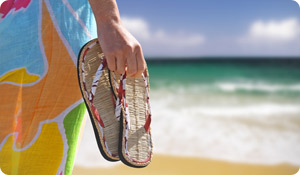
New research suggests that kicking off your shoes can help strengthen your feet, legs, and lower back, avoid foot problems like hammertoe and bunions, and even minimize the sweaty environment where bacteria and fungi thrive. But walking without shoes has many hidden dangers: stepping on sharp metal or glass; picking up a stray virus like plantar fasciitis, a parasite like hookworm, or a bacteria like pseudomonas; not to mention risking breaking or severing a toe.
If you worry about these risks, you may want to try an option like a "shoeless" fitness shoe that encases your feet in rubber like a glove, with pockets for each toe and a very thin sole. But if nothing beats being fully barefoot for you, follow these tips from the American College of Foot and Ankle Surgeons to reduce your risk and deal with any issues immediately.
Apply sunscreen to the top AND bottom of feet.
Feet burn easily - especially sensitive soles that aren't used to the sun. The risk of skin cancer developing on your feet is rare, but has been known to happen.
Keep your tetanus shot up to date.
Tetanus is fairly easy to contract if you step on a sharp object. Teens and adults should get a booster shot every 10 years.
Wear flip-flops when walking around pools, wet grass, and locker rooms.
Moist environments encourage fungi, viruses, and bacteria to grow and can break down skin's natural water barrier. The anti-slip surfaces you find around pools can also scrape your feet, leaving them more susceptible to infection.
See a doctor within 24 hours if you puncture your foot.
Even if your injury seems minor, any puncture can lead to complications ranging from infection to muscle damage. You should have a professional examine and clean the wound.
Keep your shoes on if you have diabetes
The risk of complications for diabetics outweighs the benefits of going barefoot. Diabetics may not be able to feel a minor injury and their impaired circulatory system may prevent normal healing.
Use common sense
Never go barefoot around a campfire or grill, where you're at high risk for burning yourself. And never, ever, operate a lawnmower without wearing shoes. It may sound obvious, but several people a year experience serious injuries from going barefoot in situations where common sense would say it's dangerous.
Sources:
The American College of Foot and Ankle Surgeons
http://www.acfas.org/Content.aspx?id=1430&terms=barefoot





